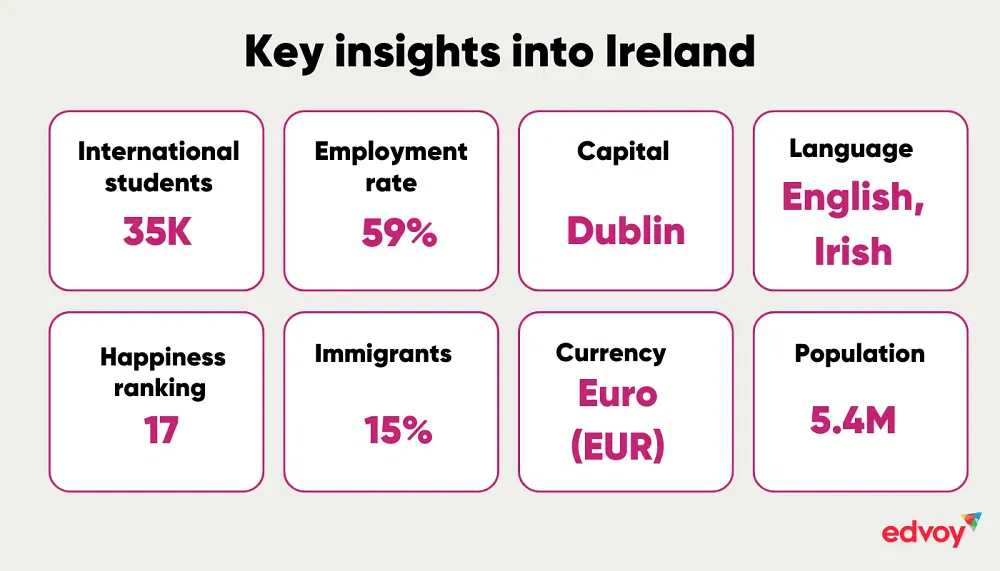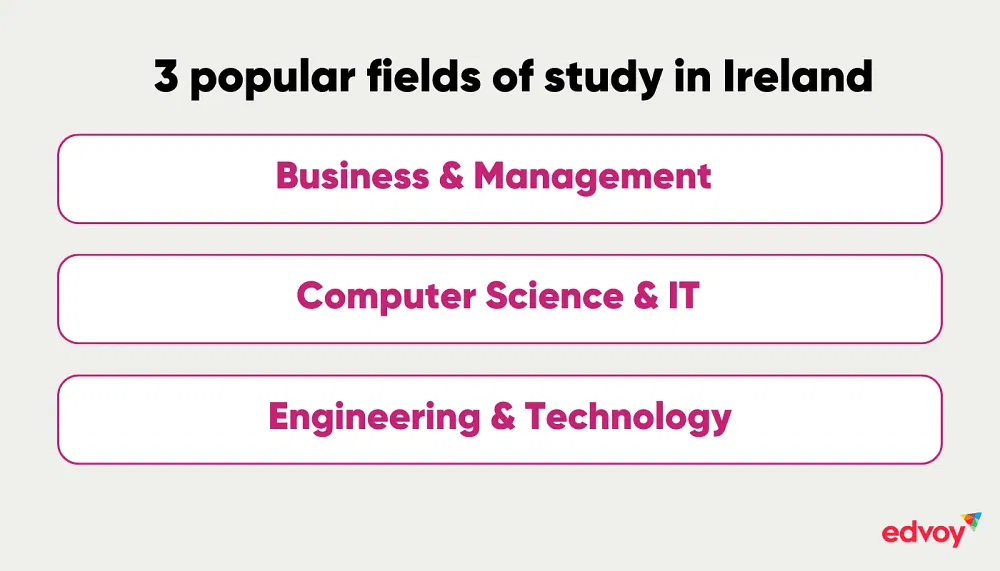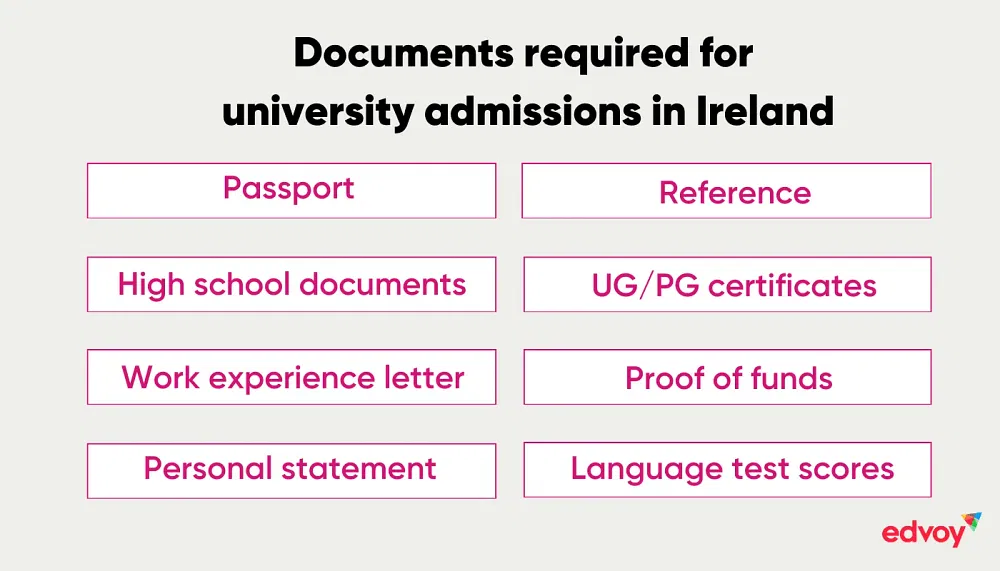Your study abroad dream needs action! Don’t miss the next intake—apply now!
Ireland stands out as a lively and culturally vibrant country featuring scenic landscapes, welcoming people, and high-quality education. With well-ranked universities and research institutes, the country is one of the most preferred study destinations for international students like you. Let’s understand a few key insights about Ireland.

Get a complete guide to studying in Ireland.
Moving to a new country is quite a lot of change in many ways: geographically, culturally, and psychologically. So, if you're concerned about courses in Ireland, it’s likely that you'll have concerns about various other aspects of life in the country. No worries. Our experts have sorted it out for you in the table below. Click on the topics you’re interested in and get the must-need information you’re looking for.
| Employment opportunities in Ireland | Student visa Ireland |
| Education system in Ireland | Student life in Ireland |
| Best universities in Ireland | Cost of living in Ireland |
One crucial factor that determines the direction of your life is the course you choose for your higher education. The skills you'll acquire, your job prospects, and your professional growth are based on this one decision. Irish universities have a range of programs that could fit well with your preferences. Whether you are interested in technology, business, healthcare, or the arts, Ireland has the right course for you. Continue reading to get more insights.
Study levels in Ireland
The study levels in Ireland range from undergraduate to postgraduate and vocational programs. These study levels cater to the various academic needs you have. The Irish education system ensures that the study levels equip you with globally recognised qualifications and skills for starting a successful career. Check out the table below to explore the details of each study level.
| Study levels | Duration | Description |
|---|---|---|
| Vocational | 1 - 6 years | Vocational training focuses on practical, career-centred education and is offered by Institutes of Technology and colleges. |
| Foundation | 6 months - 1 year | Foundation programs are preparatory courses to meet entry requirements for the university. |
| Undergraduate | 2 - 4 years | Undergraduate courses are entry-level higher education programs for those who have just finished school. |
| Postgraduate | 1 - 2 years | Postgraduate programs are advanced studies for those with an undergraduate degree. |
| Doctoral | 3 - 4 years | Doctoral programs are the highest level of academic study focused on original research. |
Popular fields of study in Ireland
Studying in Ireland gives you a great opportunity to acquire in-demand skills to be at par with global industry demands. One of the most popular fields of study in Ireland is business and management. The sector is driven by the growing presence of leading corporate giants like Google, Apple, and so on. Another high-demand field is Computer science and IT as the country is a major tech hub. Besides, engineering and technology courses also attract lots of students due to the country's focus on innovation and research. Other growing fields include healthcare, biotechnology, and finance.

Business and management courses in Ireland
The strong presence of multinational companies like Google, Apple, and Microsoft is making Ireland a global hub for finance and business. Business-oriented courses like MBA, finance, marketing, and international business, are much preferred by thousands of international students like you. The growth in this sector is going to immensely help you with excellent job prospects once you have a degree from Ireland.
Computer Science and IT courses in Ireland
Computer science and IT courses in Ireland have been in demand for a while now, and the country is now considered a tech hub in Europe. Artificial intelligence, cybersecurity, and data analytics courses are greatly sought after by students all over the world. Joining these courses is definitely going to help you with the most advanced skills for a career in leading tech firms.
Engineering and Technology courses in Ireland
Because of Ireland’s focus on innovation and research, engineering fields such as biomedical, mechanical, and software are booming now. With Ireland increasing its investment in STEM fields, the employability rate and growth in the sector are going up. If engineering courses in Ireland are what you prefer, you're in the right direction to secure a high-income job.
Recommended courses in Ireland
| Study fields | Courses | Career roles |
|---|---|---|
| Business & Management | Business Analyst, Marketing Manager, Entrepreneur | |
| Computer Science & IT | Master of Science in Data Science | Software Developer, Cybersecurity Analyst, Data Scientist |
| Engineering | Electronic and Computer Engineering | Mechanical Engineer, Software Engineer, Electronic Engineer |
| Finance & Accounting | Accountant, Financial Analyst, Investment Banker | |
| Media & Communication | Journalist, Digital Marketer, Public Relations Specialist | |
| Hospitality & Tourism Management | PGCert Hospitality Management MSc Hospitality Performance, Revenue and Asset Management PGCert Hospitality and Leadership | Hotel Manager, Event Coordinator, Travel Consultant |
Admission requirements in Ireland
Based on the university and the major you choose the admission requirement in Ireland varies. However, there are certain general documents all international students applying to universities in Ireland must submit. Take a look below to see everything you need for university admission in Ireland.

The application process
You can apply directly through the university's website or more easily through our study-abroad app. You must meet the minimum academic qualifications that vary by course and university. Generally, if you're applying for undergraduate programs, you need a high school diploma equivalent to the Irish Leaving Certificate. Likewise, a bachelor’s degree in a relevant field is essential for postgraduate programs. Some programs may require proof of relevant work experience too.
English proficiency
A key requirement you will have to meet is the English language proficiency. Most universities usually accept TOEFL (minimum 90), IELTS (minimum 6.5), PTE (minimum 63), or Duolingo (minimum 110) as proof of your English proficiency. Of course, there are exemptions to this if you’ve completed prior education in English-speaking countries. Some universities may offer English preparatory courses if you meet the required scores.
Other standardised tests
Programs in business and engineering may require you to clear tests like the GMAT and GRE with scores depending on your course and university. However, in many Irish universities, these tests are not mandatory. Instead, they focus on your academic records and professional experience.
Intakes
There are two main intakes in Ireland – September and January. For a majority of the programs, the intake is in September. You can usually start applying to the universities at least a year before the preferred intake.
Final thoughts
One crucial step towards having a bright career is the selection of a course that's apt for you, and in Ireland, you'll find some of the world's best academic programs. Irish universities are very industry-focused and most universities collaborate strongly with multinational companies to give their students great career prospects. Also, the Irish government has ensured that the learning environment in the country is warm and friendly for students. Altogether, post-study work opportunities, a safe and peaceful atmosphere, and a growing job market make the courses in Ireland a great choice for you.
If you're seriously considering Ireland for your higher studies, we have a good number of partner universities where you can apply for your preferred courses.
We’re a global technology-driven admissions platform offering study-abroad solutions to students across the world. Our AI-powered app simplifies course search, the application process, and enrollment in international universities. With 18+ years of experience, we’ve helped 85K+ students from over 25 countries to pursue their study-abroad dreams. You could be next!
Let our counsellors clear all your concerns and help you realise your dream towards being an international student. Let's start your study-abroad journey right away!
Frequently asked questions
How much bank balance is needed for an Irish student visa?
To apply for a student visa in Ireland, you need to show a minimum bank balance of EUR 12,000. It's based on the estimate that you'll need at least EUR 10,000 to 12,000 to manage your annual expenses while living in Ireland. The proof of funds that you'll have to produce during the visa application process is crucial in getting your student visa approved.
Is Ireland costly to study?
Ireland gives you excellent educational opportunities, but the costs vary depending on your lifestyle, university, course, and the city you're in. Generally, as an international student, your tuition fees for undergraduate courses range from EUR 9,850 to EUR 55,000 per year. And for postgraduate programs, it's typically between EUR 9,950 and EUR 35,000 annually.
Is it difficult to get an Ireland student visa?
Absolutely not. If you meet all the necessary requirements getting a student visa to Ireland to generally not difficult at all. The success rate for Ireland student visa applications is quite high. This shows the efficiency and reliability of the Irish visa application process